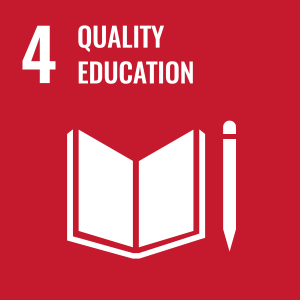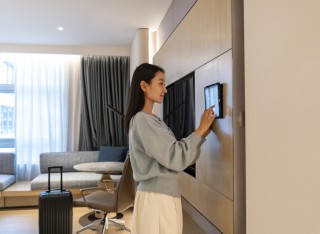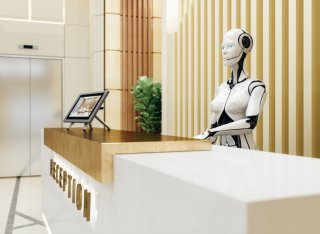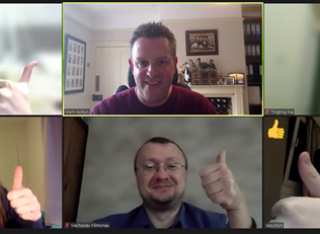
Mark Ashton
About
Biography
Mark is an award-winning educator and educational leader at the University of Surrey where he currently holds the post of Associate Dean (Education) for the Faculty of Arts, Business and Social Sciences. Mark was recognised as the Teacher of the Year for the University at the Vice-Chancellors’ Awards for Excellence in 2022 and the national CHME Annual Excellence in Learning and Teaching award for 2023. He is a Fellow of the Institute of Hospitality where he also serves as a national supervisory board member, a Principal Fellow of the Higher Education Authority and a member of the Executive Committee for the Council of Hospitality Management Educators (CHME).
Mark provides leadership as Associate Dean (Education) for the Faculty of Arts, Business and Social Sciences where he leads learning, teaching and student experience for the faculty which encompasses nine disciplinary areas across the arts, business and society delivering education from Level 3 to Level 7 to approximately 7,900 students. He leads, through influence, the Associate Heads of School (Education), disciplinary Directors of Study and Senior Personal Tutors.
Mark’s research interests focus on hospitality operations management and specifically the impacts of innovation and technology on sustainability, service design and management. Mark has published his work in leading journals and at international conferences. His first journal publication won the Outstanding Paper for the International Journal of Contemporary Hospitality Management (3* ABS Journal) Emerald Literati Award Winners for 2021. Mark is an editorial board member for Tourism and Hospitality Research, a regular peer reviewer for both the International Journal of Hospitality Management and International Journal of Contemporary Hospitality Management and a member of the scientific committee for the ENTER conference each year.
Prior to academe, Mark enjoyed a career in four and five red star hotels initially as Food and Beverage Manager at the Five Red Star Athenaeum Hotel and Apartments on Piccadilly in London. Mark later moved to Tylney Hall, a luxury Country House hotel in Hampshire, as Deputy General Manager, and became General Manager three years later. Mark's most recent General Manager’s role was at the design-led, Aviator - a hotel by Tag, in Farnborough, where he and his team secured red star status for the hotel in less than twelve months and won a string of other awards.
Mark holds a Master’s by Research from Bournemouth University in Service Process Design, a Graduate Diploma in Learning and Teaching in Higher Education from the University of Surrey, where he graduated with a First Class BSc (Hons) in Hotel and Catering Management, receiving an Associateship of the University for distinction in his professional training year.
Areas of specialism
University roles and responsibilities
- Associate Dean (Education) - FABSS
My qualifications
Previous roles
Affiliations and memberships
Business, industry and community links
News
ResearchResearch interests
My research interests align with my teaching and professional experience:
- Hospitality Operations
- Service Design/Management
- AI in Service Design
- Restaurant Innovation
- People in the Hospitality Industry
- Hospitality Management Education
Research projects
Rationale
- This module provides final year students with the opportunity to look in depth at the development of the restaurant industry drawing on current and historical operations and track their development from single unit to international chain. From a programme perspective it provides an opportunity to specialise in the consideration and appreciation of the complexity of food and beverage operations
- We are working to solidify further a sustainable learning community for the module that includes staff, students, industry professionals and analysts - it is this collaborative approach, and its impact on student learning/engagement/results that we want to understand better and evaluate through this funding
- The second rationale is to continue to up-date and improve the learning resources used to support the module (current main text is from 1992)
Objectives
- To obtain more detailed feedback/evaluation of the module from students and industry partners through focus groups with the objective of continuous improvement (2 student’s focus groups with 10 in each and 1 industry partners focus group of up to 10)
- Continue to solidify the learning community across all stakeholders – we plan to run an industry partners focus group to understand their experience of the module, how the more open approach of encouraging attendance at multiple sessions worked and how they feel they can help support an even more engaged learning community
- Develop more up-to-date online learning resources (Case Studies and a student friendly Summary of the Key Theory used: Service Firm Lifecycle, SFLC) to better apply the SFLC to contemporary business cases and update the base theory
Student Evaluation of the MSc Dissertation ModuleThis project aims to bring the student voice to the evaluation of the MSc Dissertation module as the School of Hospitality and Tourism Management go through the Curriculum Design Review and explore how we can improve the student experience and academic performance through the enhancement of the module and programme design. The project will run two online questionnaires, one for the February cohort and another for the September cohort, to obtain detailed student feedback and evaluation of the Dissertation module and their journey from the Research Methods module, which is a pre-requisite module. The findings of the project aim to provide evidence to help redesign the module and programme structure, embedding the five pillars of the Curriculum Framework.
Indicators of esteem
I was recognised as the Early Career Teacher of the Year for the School of Hospitality and Tourism Management in 2020
With two colleagues, I led a module where we were recognised for the School of Hospitality and Tourism Management Collaborative Teaching Award in 2021
I was recognised as the Teacher of the Year for the Univerity of Surrey at the Vice-Chancellors Awards for Excellence in 2022 having been recognised at School and Faculty Level for the same award
Emerald Literati Awards - Outstanding Paper - How will service robots redefine leadership in hotel management? A Delphi approach - International Journal of Contemporary Hospitality Management
Journal of Hospitality and Tourism Education - High Commended Paper 2025 - Does an Attendance Policy Positively Impact Staff and Student Wellbeing? A Case Study Exploring Attitudes Toward a University of Surrey Attendance Policy
Research interests
My research interests align with my teaching and professional experience:
- Hospitality Operations
- Service Design/Management
- AI in Service Design
- Restaurant Innovation
- People in the Hospitality Industry
- Hospitality Management Education
Research projects
Rationale
- This module provides final year students with the opportunity to look in depth at the development of the restaurant industry drawing on current and historical operations and track their development from single unit to international chain. From a programme perspective it provides an opportunity to specialise in the consideration and appreciation of the complexity of food and beverage operations
- We are working to solidify further a sustainable learning community for the module that includes staff, students, industry professionals and analysts - it is this collaborative approach, and its impact on student learning/engagement/results that we want to understand better and evaluate through this funding
- The second rationale is to continue to up-date and improve the learning resources used to support the module (current main text is from 1992)
Objectives
- To obtain more detailed feedback/evaluation of the module from students and industry partners through focus groups with the objective of continuous improvement (2 student’s focus groups with 10 in each and 1 industry partners focus group of up to 10)
- Continue to solidify the learning community across all stakeholders – we plan to run an industry partners focus group to understand their experience of the module, how the more open approach of encouraging attendance at multiple sessions worked and how they feel they can help support an even more engaged learning community
- Develop more up-to-date online learning resources (Case Studies and a student friendly Summary of the Key Theory used: Service Firm Lifecycle, SFLC) to better apply the SFLC to contemporary business cases and update the base theory
This project aims to bring the student voice to the evaluation of the MSc Dissertation module as the School of Hospitality and Tourism Management go through the Curriculum Design Review and explore how we can improve the student experience and academic performance through the enhancement of the module and programme design. The project will run two online questionnaires, one for the February cohort and another for the September cohort, to obtain detailed student feedback and evaluation of the Dissertation module and their journey from the Research Methods module, which is a pre-requisite module. The findings of the project aim to provide evidence to help redesign the module and programme structure, embedding the five pillars of the Curriculum Framework.
Indicators of esteem
I was recognised as the Early Career Teacher of the Year for the School of Hospitality and Tourism Management in 2020
With two colleagues, I led a module where we were recognised for the School of Hospitality and Tourism Management Collaborative Teaching Award in 2021
I was recognised as the Teacher of the Year for the Univerity of Surrey at the Vice-Chancellors Awards for Excellence in 2022 having been recognised at School and Faculty Level for the same award
Emerald Literati Awards - Outstanding Paper - How will service robots redefine leadership in hotel management? A Delphi approach - International Journal of Contemporary Hospitality Management
Journal of Hospitality and Tourism Education - High Commended Paper 2025 - Does an Attendance Policy Positively Impact Staff and Student Wellbeing? A Case Study Exploring Attitudes Toward a University of Surrey Attendance Policy
Teaching
Semester 1
Hospitality Events Management (Level 6)
Hospitality Operations Analysis (Level 7)
Hotel Operations Analysis (Level 7)
Operation Systems and Sustainability (Level 7)
Semester 2
Understanding Service Delivery (Level 4)
Gastronomy (Level 5)
Operations Analysis (Level 5)
Innovation and Development in Restaurant Operations (Level 6)
Designing Digital Hospitality Services (Level 7)
Designing Digital Services (Level 7)
I was recognised as the Early Career Teacher of the Year for the School of Hospitality and Tourism Management in 2020
With two colleagues, I led a module where we were recognised for the School of Hospitality and Tourism Management Collaborative Teaching Award in 2021
I was recognised as the Teacher of the Year for the Univerity of Surrey at the Vice-Chancellors Awards for Excellence in 2022 having been recognised at School and Faculty Level for the same award
Sustainable development goals
My research interests are related to the following:



Publications
The hospitality industry, encompassing operations from hotels and resorts to restaurants and event venues, faces increasing pressure to integrate sustainability into its core business practices. The rapid proliferation of artificial intelligence (AI) offers potential to make the industry more sustainable, but this potential remains empirically underexplored. This study bridges this knowledge gap by introducing the convergence innovation framework, a concept defining the fusion of distinct domains to create novel solutions, to examine the integration of AI within hospitality operations for enhanced sustainability across environmental, social, and economic dimensions. Through semi-structured interviews with 35 senior industry professionals in the United Kingdom and Spain, the study reveals that, beyond well-known efficiency gains, AI can mitigate environmental impact through proactive optimisation of energy and water consumption, dynamic waste minimisation systems, and intelligent building management that adapts to real-time conditions. AI can improve social sustainability by personalising guest experiences tailored to eco-friendly preferences and enhancing staff well-being through optimised operational tasks. Economically, AI holds opportunities for precision in supply chain management and demand forecasting, leading to waste reduction and cost savings. These findings offer empirically grounded insights for hospitality organisations to strategically capitalise on the convergence of AI and sustainability, promoting resilience and competitive advantage in a rapidly evolving hospitality market.
AI-powered devices, for example, service robots, are expected to revolutionize hospitality. As a result, research on service robots has surged in the context of hospitality. While prior studies have explored customer and employee attitudes toward using or abandoning robots in different contexts, for example, health care, there is a dearth of research into strategic decision-makers’ views on deciding to continue using or abandoning service robots in hospitality settings after their introduction. To that end, we adopt the Technology-Organization-Environment (TOE) framework through a phenomenon-driven bottom-up approach to explore why strategic decision-makers plan to (dis)continue using service robots in hospitality after their introduction. In practice, semistructured interviews were conducted with robot suppliers (n = 8) and strategic decision-makers (n = 10) to explore the planned (dis)continuance of service robot usage. Six key factors related to planned (dis)continuance of service robots in hospitality settings were found, revolving around drivers and barriers of robot adoption (e.g., availability of off-the-shelf robot solutions; operational complexity), the strategic focus of the company (e.g., vision and mission), the user experience (e.g., robots’ persona), technical aspects (e.g., sensors and interoperability), and economic aspects (e.g., managing cashflow). Extending the Technology-Organization-Environment framework, we derive implications for hospitality management theory and practice by developing a novel model for planned (dis)continuance of service robot usage, thus adding to the broader body of work on robot usage continuance in operational settings.
The increasing adoption of Algorithmic Management in the hospitality sector presents a number of challenges and opportunities. Emergent research has considered the impacts on operational staff. However, the implications for frontline managers, who have to negotiate between the interests of multiple stakeholders and organisational pressures, are less well understood. This paper examines key factors that will affect the comprehension and enactment of managerial roles within algorithmically managed hotels, drawing on a three-stage Delphi study with hotel managers and academic experts, built on the Competing Values Framework. The findings stress that Algorithmic Management’s impact on productivity and process standardisation will intensify work demands, and risk stifling employee motivation and collaboration. Hence, managers must evolve from controllers to supportive actors, improving understanding, facilitating employee empowerment and aiding transparency in algorithmic decisions. We conceptualise these functions as communication, performance, social and creative facilitation. The findings are used to theorise how emerging socio-technological arrangements will transform line management, driving the expansion of translational work and the emergence of what we call ‘algorithmic coaching’.
Purpose The use of artificial intelligence (AI) in the workplace is on the rise. To help advance research in this area, the authors synthesise the academic research and develop research propositions on the antecedents and consequences of AI adoption and application in the workplace to guide future research. The authors also present AI research in the socio-technical system context to provide a springboard for new research to fill the knowledge gap of the adoption and application of AI in the workplace. Design/methodology/approach This paper summarises the existing literature and builds a theoretically grounded conceptual framework on the socio-technical system theory that captures the essence of the impact of AI in the workplace. Findings The antecedents of AI adoption and application include personnel subsystem, technical subsystem, organisational structure subsystem and environmental factors. The consequences of AI adoption and application include individual, organisational and employment-related outcomes. Practical implications A research agenda is provided to identify and discuss future research that comprises not only insightful theoretical contributions but also practical implications. A greater understanding of AI adoption from socio-technical system perspective will enable managers and practitioners to develop effective AI adoption strategies, enhance employees' work experience and achieve competitive advantage for organisations. Originality/value Drawing on the socio-technical system theory, the proposed conceptual framework provides a comprehensive understanding of the antecedents and consequences of AI adoption and application in the work environment. The authors discuss the main contributions to theory and practice, along with potential future research directions of AI in the workplace related to three key themes at the individual, organisational and employment level.
The rapid growth of B Corp certified organisations in the UK hospitality sector calls for a better understanding of their potential to influence the supply and demand sides of the market. It also requires an outline of a dedicated research agenda which will inform the design and implementation of future studies concerned with the impact of the B Corp certification on hospitality operations and strategies. This viewpoint reviews B Corp as an emerging trend in the UK hospitality sector. It discusses the collective potential of B Corps to disrupt the hospitality market and enable its progress towards more inclusive, resilient and environmentally sustainable business models and practices. The viewpoint proposes a research agenda underpinned by four perspectives which can inform the emerging academic and industry discourse on the policy, management and wider societal and environmental implications of the B Corp movement in the hospitality sector of the UK and beyond.
Throughout their career, chefs develop practices for food waste mitigation, but little is known about how these practices occur and evolve. This study draws upon the social practice theory, social leaning theory and ecological systems theory to explore the lifelong experiences of food waste and its management among 44 chefs in England, Indonesia, Poland, and Russia. The study highlights the multiple environments in which chefs develop the practice of food waste management. The main points for intervention within a lifelong experience of chefs where they start recognising the significance of food waste and develop skills for its mitigation are identified. The study showcases family and senior chefs/supervisors as the key actors of learning who shape the meanings of food waste among chefs and provide them with competencies towards its management. The role of education providers in preparing chefs for dealing with food waste in professional kitchens is established as limited. •Chefs develop the practice of food waste management throughout their lifelong experience and career.•Meanings of food waste management are mostly formed in childhood.•Competencies and materiality are mostly formed early in professional career.•Parents, senior chefs and supervisors are the key actors of learning.•Education providers play a limited role in shaping chefs’ food waste management practices.
Governments across the world have imposed strict rules on social distancing to curb the spread of Covid-19. In particular, restaurants have been impacted by government-mandated lockdowns. This study adopts a mixed methods approach to explore how Finnish high-profile restaurants used Instagram as a means for service innovation and diffusion during nine weeks of government-mandated lockdown. Comparatively analysing 1,119 Instagram posts across two time-stamps (2019 and 2020) and across 45 restaurants, as well as conducting five semi-structured interviews with restaurant managers, it is found that while the overall number of Instagram posts and likes on posts stayed relatively similar to the year prior, the number of comments increased significantly, suggesting a move towards a more didactic and dyadic form of Instagram communication. In addition, four digital service innovation strategies are identified: launching new service offerings and introducing new elements to existing service offerings, fostering social relationship with customers, exploring novel streams of revenue, and reinvigorating the brand’s image. Implications to service innovation theory and practice are discussed, along with suggestions for future research.
The kitchen is a gendered realm dominated by masculine culture, but some female chefs challenge this norm by introducing soft skills. This paper conceptualizes the multilayered cultural realm of food waste management in professional kitchens and pinpoints the critical role of individual gender traits of chefs in food prevention and reduction (‘preduction’). The paper outlines directions for future research on the gender-related position of chefs.
Purpose The rapid growth in volume and value of on-demand restaurant food delivery, accelerated by the COVID-19 pandemic, is causing a paradigm shift in the food service sector. However, there is a lack of hospitality management research into this emerging phenomenon. To address this gap, this paper defines and develops a novel conceptual model and typology and proposes a research agenda for ghost production in the context of food service. Design/methodology/approach This paper uses the Servuction model to explore, define and model the radical separation between food service production sites, points of sale and consumer interaction from the perspective of on-demand restaurant food delivery. A novel typology is developed and illustrated with eight industry examples from the UK and an accompanying cost benefit analysis. Future research priorities are identified. Findings In the hospitality literature, little attention has been paid to changes on-demand restaurant food delivery brings to production and business models of food service organisations, resulting in significant gaps between food service practice and theory. The knock-on effects to stakeholders include increased convenience for customers, uncertain employment status of riders and, for restaurants, striking a balance between capturing new markets and losing control of the customer. Additionally, for aggregators, there is a lack of profitability in existing models, despite holding the balance of power (and data). Originality/value The concept of “ghost production” and its associated typology is novel and offers a contribution to hospitality management literature by defining the term, scope and scale of this new phenomenon. Practical implications are proposed.
Purpose – Although virtual worlds, such as the Metaverse, can disrupt the hospitality sector, few empirical investigations have critically evaluated the scope and scale of this disruption from an industry perspective. This study aims to rectify this knowledge gap by exploring the opportunities and challenges of the Metaverse as seen by hospitality professionals. Design/methodology/approach – This is a Delphi study conducted with UK-based senior hospitality industry practitioners experienced in designing and implementing digital innovations within their organisations. Findings – The Metaverse is most likely to be adopted by hospitality organisations willing and able to take risks, such as large and/or chain-affiliated enterprises. The Metaverse will not replace traditional hospitality services but supplement and enhance them with new layers of service. The main applications are in the context of events and experiences. The Metaverse will also provide the " try before you buy " option, revealing the opportunities to design digital twins of physical businesses. Young and technology-savvy individuals are most likely to first adopt the Metaverse. The key challenges of the adoption are attributed to the technological unpreparedness of hospitality organisations; market immaturity; inflated customer expectations; a skills gap among hospitality employees; and regulatory issues. These challenges require the engagement of various stakeholders to create an operational and monitoring framework for hospitality organisations to embrace the Metaverse. Practical implications – This study highlights how the Metaverse can disrupt the hospitality industry at the level of strategic planning and business operations. Originality/value – To the best of the authors' knowledge, this is one of the first empirical investigations of the potential of the Metaverse from the viewpoint of hospitality industry practitioners.
Purpose Virtual spaces, commonly referred to as the Metaverse, are predicted to disrupt consumption patterns in tourism, hospitality and events (THE) by shifting some user experiences to a virtual world. Scholarly investigations are necessitated to aid in an understanding of virtual spaces and the implications of their consumption for THE industries. This viewpoint outlines a provisional research agenda on virtual spaces. Design/methodology/approach To inform its arguments, this viewpoint draws upon academic and grey literature surrounding the emerging topic of the Metaverse in THE industries. Findings The research agenda should consider four perspectives representing different actors of THE value chain, i.e. developers/suppliers, THE business professionals, customers and policymakers. The research agenda should also incorporate the wider spillover effects of consumption of virtual spaces which may stretch well beyond THE industries. Originality/value This viewpoint outlines some research directions which may aid different actors of THE value chain alongside academics in better understanding the emerging phenomenon of virtual spaces and comprehend the opportunities and challenges associated with their uptake by THE industries.
This investigation reviews the University of Surrey’s School of Hospitality and Tourism Management (SHTM) attendance policy, requiring students to meet the Senior Personal Tutor (SPT) to determine reasons for absences and to provide support for the student. Research was conducted to achieve four objectives; to understand student and staff attitudes toward the attendance policy, to identify reasons for student absence, to evaluate the effectiveness of registers as a tool for wellbeing intervention and to evaluate the impact of the policy on staff wellbeing. A qualitative approach assessed staff and student views of the policy and findings connect student absences with staff and student wellbeing, indicating that attendance monitoring can improve a student’s sense of belonging. The study provides a framework for using learning analytics to support student and staff wellbeing, draws attention to the role of the SPT and contributes to literature connecting student attendance with staff and student wellbeing.
Many hotel organizations were helping their employees remain engaged in the workplace during the pandemic. From the perspective of social exchange theory, the antecedents and outcome of this engagement were explored in two studies. A qualitative interview investigation of U.K. hotel employee engagement as reported by Senior Managers (n = 9) was carried out in Study 1 from which a theoretical model to investigate the antecedents and outcome of this engagement was developed, and tested with U.K. hotel employees (n = 163) in Study 2, with both studies conducted sequentially during the pandemic. Study 1 found that the emergence of new methods and styles of communication, the provision of and increased access to training, and employees’ adaptation to changes positively facilitated employee engagement through the pandemic. Results of Study 2 suggested that employee resilience, perceived communication quality, and workplace health and safety training are positively related to employee engagement, which in turn improves employee performance. This research enhances the theoretical understanding of the personal factor (i.e., employee resilience) and situational factors (i.e., perceived communication quality, and workplace health and safety training) that help enhance employee engagement and ultimately improve performance. The practical implications of the study propose means of effective communication with employees, mechanisms to bolster employee resilience and proactive health and safety training and reinduction of employees ahead of their return to work with guests during times of extreme turbulence.
COVID-19 lockdown measures have forced hospitality operators to re-configure their dynamic capabilities through innovating operational practices and pivoting traditional business models. The high-end food service sector has undergone a particularly drastic shift towards a new normal. This qualitative study explores factors facilitating innovation at 16 high-end food service organizations in Finland and the UK through semi-structured expert interviews. Three key themes facilitating innovation during COVID-19 lockdowns are identified: 1) Combining high-tech and high-touch through new ways of producing and providing technology-driven service offerings, 2) Prosocial engagement, i.e. working together with multiple stakeholders to bring added value to all parties, not just the business, and 3) Reactivity, i.e. pushing the traditional boundaries of the sector through quick decision-making and constant iteration and refining of processes and procedures. Drawing our empirical findings together, innovation during COVID-19 lockdowns in high-end food service is conceptualized into three phases: React, Refine, and Reflect.
This study explores how female chefs in professional kitchens manage food waste in their predominantly masculine occupational culture. By adopting the Process-Person-Context-Time (PPCT) model and applying the method of in-depth, semi-structured interviews (n = 20), the study reveals the complex interplay of personal, organisational, and contextual influences on how female chefs in Turkey and England manage food waste. The study highlights the significance of proximal processes, and organisational and occupational socialization in shaping food waste management practices of female chefs. The study underscores the importance of gender dynamics, organizational size, and occupational culture in these practices. The need for integrating resourcefulness training in preparation for future generations of chefs is highlighted. The findings enable a better understanding of how professional kitchens can be advanced towards the fulfilment of such sustainable development goals as gender equality and resource efficiency. The study emphasizes the need to consider a broader cultural context in future research on sustainability in tourism and hospitality. It suggests a comparative gender analysis to examine the unique challenges that female chefs encounter in food waste management.
Purpose – Using the Delphi technique, this paper aims to investigate how human resource experts perceive service robots will impact leadership and human resource management in the hospitality industry. Design/methodology/approach – A three-stage Delphi study with hotel industry human resource experts was conducted to identify the key trends and major challenges that will emerge in the next ten years and how leaders should deal with the challenges brought about by service robot technologies. Findings – Results show that while service robots are anticipated to increase efficiency and productivity of hotel activities, they may also pose challenges such as high costs, skill deficits, and significant changes to the organizational structure and culture of hotels. Therefore, the anticipated applications and integration of robotic technology will require leaders of the future to carefully consider the balance between the roles of service robots and human employees in the guest experience, and to nurture a work environment that embraces open-mindedness and change. Originality/value – This is the first type of study to examine hospitality leadership and human resource management in the context of robotized hotels. This study has taken an important step to understand the leadership role in robotized hotels from a human resource perspective, and brings clarity as to how robotic technology can influence leadership in the future workplace.
Additional publications
Research Thesis
Ashton, M. (2020) Robotics, Artificial Intelligence and Service Automation in Hotel Service Process Design: Can Customer Dominant Logic Provide Improved Value? Masters by Research Thesis Bournemouth University Research Online [BURO] - Robotics, artificial intelligence and service automation in hotel service process design: can customer dominant logic provide improved value?
Journal Articles
Yu, X., Xu, S. and Ashton, M. (2022), "Antecedents and outcomes of artificial intelligence adoption and application in the workplace: the socio-technical system theory perspective", Information Technology & People, Vol. ahead-of-print No. ahead-of-print. https://doi.org/10.1108/ITP-04-2021-0254
Xu, S., Stienmetz, J. and Ashton, M. (2020), "How will service robots redefine leadership in hotel management? A Delphi approach", International Journal of Contemporary Hospitality Management, Vol. ahead-of-print No. ahead-of-print. https://doi.org/10.1108/IJCHM-05-2019-0505
Conference Papers
Tuomi, A., Ashton, M., Ellonen, H.K. and Tussyadiah, I., (2022) "Innovation in High-End Food Service During COVID-19 Lockdowns", Proceedings of the 55th Hawaii International Conference on System Sciences content (hawaii.edu)
Tuomi A., Tussyadiah I., Ashton M. (2021) Covid-19 and Instagram: Digital Service Innovation in Top Restaurants. In: Wörndl W., Koo C., Stienmetz J.L. (eds) Information and Communication Technologies in Tourism 2021. Springer, Cham. https://doi.org/10.1007/978-3-030-65785-7_45.
Xu, S., Tuomi, A., Stienmetz, J., & Ashton, M. (2020, April). Esprit de Robo-Corps (EdR-C): Developing a scale for the acceptance of robotic co-worker in the hospitality and tourism environments. Stand-up Presentation at the 2020 TTRA Europe conference, Innsbruck, Austria.



